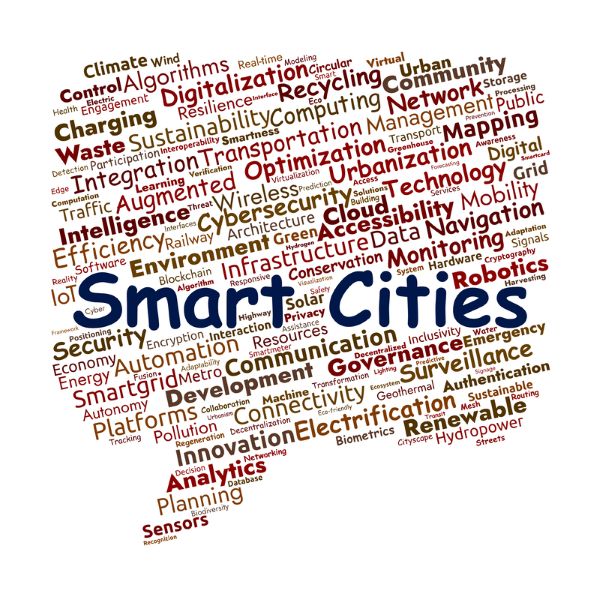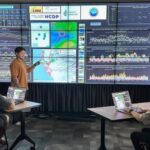Harry Poulson has sent this article to me for posting here on the 21st Century Tech Blog. Why are “smart city” solutions more important than ever? Cities today are home to the majority of people on this planet. In 2023, urban dwellers represented 55%. In 2025, the number will grow to 58%. By 2050, the number will be 68%. That means 4.75 billion people call cities home today, and more than 6.6 billion will live in them by mid-century.
“Smart City” solutions in the 21st century are needed now and even more in a future of rapid urbanization while dealing with global climate change. That requires leveraging the technology we have at present and inventing even more, as well as data gathering and analysis to develop and implement policies and smart solutions for urban sustainability that harmonize with the environment and mitigate or adapt to climate change.
To make the subject even more complex, not all cities are alike. Many cities in the Global South feature informal settlements that lack infrastructure, have insecure land tenure, social vulnerabilities, and face greater environmental threats than cities of the Global North.
These informal settlements go by different names: favelas in Rio de Janeiro, Brazil, floating slums in Lagos, Nigeria, colonias populares in Mexico City, villas miseria in Buenos Aires, Argentina, and elsewhere, slums, garbage cities, shanty towns and township settlements. Today, they house more than one billion. What “smart city” solutions can be implemented for them?
Over 70,000 regularly see these postings and your visits and continued support are much appreciated. So we welcome how smart city solutions are working in your cities as well as ideas you have to improve urban communities.
As urban populations continue to grow, cities face increasing difficulties in managing resources, infrastructure, and public services. Smart city solutions, however, offer ways to enhance urban management using advanced technology, data-driven decision-making, and automation. Integrating smart systems into city management improves efficiency, sustainability, and the overall quality of life for current and future residents.
What entails smart city solutions?
Smart Traffic and Transportation Systems
Whether cities are in the Global North or South, traffic management is a major headache. Smart traffic systems, sensors, cameras, and AI-driven analytics can help monitor and manage traffic flows in real time. Adaptive traffic signals adjust timing based on the traffic conditions of the moment, reducing delays and fuel consumption and increasing driver safety. Intelligent public transport systems feed real-time updates to commuters using public transit and optimize routes to meet demand. In parking-challenged cities, smart solutions find available spots using mobile apps.
Energy-Efficient Smart Grids
Managing energy consumption in cities is crucial for sustainability. Smart grids incorporate Internet of Things (IoT) sensors and artificial intelligence (AI) solutions to help track energy usage and its distribution. Automated demand-response systems adjust power distribution based on real-time demand, preventing energy wastage. Smart meters installed in homes and businesses encourage energy conservation. Renewable energy sources deliver solar and wind energy to the urban grid or provide off-grid local distribution.
The combination of all of these solutions improves energy efficiency and contributes to lowering operational costs and urban environmental sustainability.
Waste Management Optimization
As much as cities attempt to manage waste, it remains one of the largest challenges to urban sustainability. Traditional collection methods are inefficient. Landfills where the waste is transported are sources of greenhouse gas pollution. Overflowing bins are unsightly and a health hazard.
Smart waste management systems that use IoT sensors deployed in trash bins provide real-time data to waste collection services to eliminate garbage piling up. AI route optimization software helps collection trucks choose efficient routes and reduces fuel use and emissions.
Applying circular economic waste management strategies eliminates waste sources from the point of product design and production to reduce downstream problems. Even in informal communities within the Global South, solutions that produce value from the waste stream support entrepreneurs in these communities and a growing waste repurposing economy.
Public Safety and Surveillance
Safe cities are sustainable and resilient. Public safety is a priority for urban management using smart technologies to help prevent crime, improve emergency response, and aid in disaster management. Cameras incorporating AI detect unusual activities and alert authorities in real time. Smart emergency response systems use GPS tracking to alert first responders faster. IoT-connected disaster monitoring systems predict and mitigate risks such as floods, earthquakes, and fires.
Digital Governance and Citizen Engagement
Communication by governments to citizens is critical to sustainable cities. Smart city solutions offer tools for digital governance and public engagement using E-government portals that allow residents to access public services online without long waits. Smartphone applications allow citizens to report infrastructure issues from potholes to broken streetlights. AI-powered chatbots answer residents and improve response times to queries.
Are Smart Solutions Good For All Cities?
For the informal communities in cities of the Global South, do smart solutions have any place? For example, only 15% of those living in informal communities in Sub-Saharan Africa have access to smartphones and their apps. That makes replicating smart city solutions from the Global North difficult to achieve.
Where smart city solutions appear in cities of the Global South is not in the informal communities where the poorest live, but in high-income urban areas. To overcome this an organization called Slum Dwellers International (SDI) is using GPS and digital surveys to map informal settlements and replace them with new social housing units with modern sanitation and plumbing.
Lessons for Equitable Implementation of Smart City Solutions
A key to making smart city solutions work in the Global South is involving these communities in the solutions. That means providing legal recognition to property claims, upgrading power and telecommunications infrastructure, and educating those living in these informal settlements to use smart technologies. It also means municipal governments need to prioritize upgrading and technology-enabling informal communities rather than bulldozing them to deliver smart city solutions equitably.









